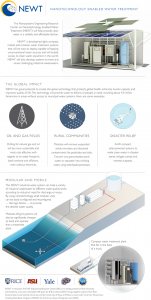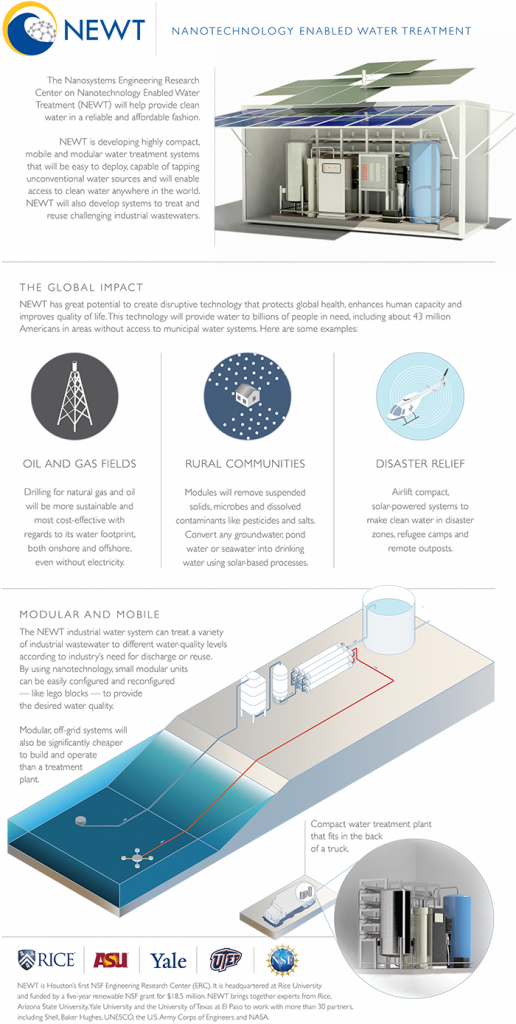 The National Science Foundation (NSF) has awarded a prestigious Engineering Research Center (ERC) grant to a team of leading experts in nanotechnology and advanced water treatment from The University of Texas at El Paso (UTEP), Rice University, Arizona State University (ASU) and Yale University toward the development of scientific advances that will address the world’s urgent demand for clean water through low-cost, energy- and environmentally friendly methods. The five-year, $18.5 million grant will be shared among the four institutions and can be renewed for a potential term of 10 years.
The National Science Foundation (NSF) has awarded a prestigious Engineering Research Center (ERC) grant to a team of leading experts in nanotechnology and advanced water treatment from The University of Texas at El Paso (UTEP), Rice University, Arizona State University (ASU) and Yale University toward the development of scientific advances that will address the world’s urgent demand for clean water through low-cost, energy- and environmentally friendly methods. The five-year, $18.5 million grant will be shared among the four institutions and can be renewed for a potential term of 10 years.
“We are extremely pleased that UTEP is a partner in this successful NSF Engineering Research Center grant,” said UTEP President Diana Natalicio. “This partnership will bring environmental, educational and economic resources to the El Paso area for the development of revolutionary, nanotechnology-based water treatment systems. Most importantly over the longer term, it will help provide clean water to the millions of people across the globe who desperately need it.”
This ERC grant is the first for UTEP, and only the third awarded in Texas in nearly 30 years. The results from this grant have the potential to benefit 43 million Americans who rely on private wells for water with little or no treatment and the 780 million people worldwide who have no access to clean water.
“I became a chemical engineer and environmental chemist because I wanted to do research related to the protection of the environment,” said Jorge Gardea-Torresdey, Ph.D., the UTEP Project leader, chair of the department of chemistry and professor of chemistry and environmental science and engineering at UTEP. “During the past 20 years, I have been working on the implications of nanotechnology in the environment. This ERC grant is a dream come true, because we are going to protect the environment by producing drinking water using nanotechnology. I feel incredibly honored and happy to have contributed to this grant, which will benefit millions of people around the world.”
Over the next five years, the research group proposes to take advantage of the unique properties of engineered nanomaterials (ENMs) to remove contaminants from water. The team’s aim is to create new systems that use fewer chemicals, produce little to no waste, create fewer to no harmful disinfection byproducts and require less energy to operate.
These new systems will be integrated as portable modular units – individual columns assembled according to the pollutants they need to remove from water, whether arsenic, copper, lead or any other contaminants. The systems will be constantly reassessed to target all EPA pollutants in drinking water. Industrial sites where there is no electrical grid to operate current energy-intensive purification systems may benefit, including local colonias – neighborhoods in the Texas-Mexico border region without potable (drinkable) water infrastructures.
“This is an incredibly prestigious award that once again puts UTEP on the map for its strong research program. I am pleased that faculty from the Colleges of Science, Engineering and Health Sciences have come together to pool the talent needed to address this challenging topic,” said Robert Kirken, Ph.D., dean of UTEP’s College of Science. “This grant award represents some of the best that UTEP has to offer, from the entrepreneurial spirit to the resources and faculty to help create something that can have a major impact on humanity. The nanotechnology proposed in this NSF grant is very cutting edge and has the capable to address “real world issues” immediately along with the ability to create jobs.”
“We are very pleased to be part of this team. The research performed by this team will complement the research performed by our Center for Inland Desalination Systems and by faculty in the Department of Civil Engineering. Access to clean and affordable water is a global grand challenge that must be addressed,” said Richard Schoephoerster, Ph.D., dean of the College of Engineering at UTEP.
Other members of the UTEP research team are Assistant Professor of Social Work Eva Moya, Ph.D.; Associate Professor of Chemistry Juan Noveron, Ph.D.; Assistant Professor of Chemistry Dino Villagran, Ph.D.; and Assistant Professor of Civil Engineering Shane Walker, Ph.D.
“The UTEP College of Health Sciences is excited to participate as a team member in this important initiative. Access to potable water is a critical component of human security and a key public health concern for our community. We look forward to the engagement of our faculty and students, as well as regional community health workers to help develop much needed solutions within our communities in the Texas-Mexico border region,” said Dean of the College of Health Sciences Kathleen A. Curtis, PT, Ph.D.
The project will result in bountiful training and mentoring opportunities for university students. Additionally, outreach activities will recruit and retain K-12 STEM (science, technology, engineering and math) teachers and their students, many who are from groups traditionally underrepresented in STEM fields.
The National Science Foundation (NSF) is an independent federal agency that supports fundamental research and education across all fields of science and engineering. In fiscal year (FY) 2015, its budget is $7.3 billion. NSF funds reach all 50 states through grants to nearly 2,000 colleges, universities and other institutions. Each year, NSF receives about 48,000 competitive proposals for funding, and makes about 11,000 new funding awards. NSF also awards about $626 million in professional and service contracts yearly.
